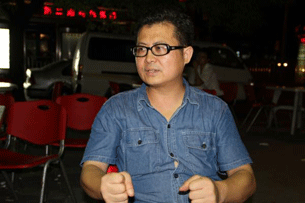
Guo Feixiong in a file photo. Photo courtesy of Guo Feixiong
Chinese political prisoner Guo Feixiong is receiving hospital treatment after ending his hunger strike after more than 100 days last week, his lawyer said on Tuesday.
Guo, whose birth name is Yang Maodong, had been subjected to forced feeding after beginning his hunger strike in early May in protest at the treatment of political prisoners in China.
His lawyers had requested his transfer from Yangchun Prison in the southern province of Guangdong after a public outcry triggered by his hunger strike.
His defense lawyer Zhang Lei said he is currently in the hospital of Guangdong’s Yingde Prison, suggesting that his request for a transfer has been granted.
“I haven’t met with him yet [since the move],” Zhang said. “We will be visiting him at an appropriate time.”
He added: “I don’t know many more details of the situation, but the travel arrangements to get to Yingde Prison are slightly easier than they were for Yangchun Prison.”
Treatment uncertain
Fellow rights lawyer Zhu Chengzhi, who has been a vocal supporter of Guo’s, said it is still unclear whether Guo’s other demands for better treatment for political prisoners, including himself, have been met.
“The authorities have now transferred him to another prison,” Zhu said. “But we won’t know for a while whether they are treating Guo in a more humane manner than before.”
He said Guo’s brother Yang Maoquan had visited him in the prison hospital on Monday, confirming that his hunger strike had ended.
Guo began his hunger strike on May 9, calling on President Xi Jinping to implement democratic reforms, end the use of electric shocks in prison, improve the treatment of political prisoners, and ratify a United Nations covenant on civil and political rights.
His action was prompted by a forced rectal cavity search at the instigation of state security police, as well as forced head shaving and verbal abuse from prison guards, his sister said at the time.
More than 400 rights activists across China have now ended a relay hunger strike in support of Guo, Zhu said.
But concerns about Guo’s deteriorating health remain.
Bleeding stomach
His sister Yang Maoping, who is a physician, has raised concerns that Guo may be suffering from gastrointestinal tumors, as he has shown chronic symptoms but was denied more detailed tests while in Yangchun Prison.
“One of the more serious symptoms is that he is bleeding from the stomach,” Zhu said.
Guangxi-based rights activist Qi Qinhong called on the authorities to release Guo on medical parole.
“His health is really very poor right now,” Qi said. “During his spell in the detention center, he was basically unable to relax, and he was also tortured and mistreated in there.”
“The only way of saving him is for him to be released to seek medical treatment.”
According to the New York-based Human Rights Watch (HRW), Yangchun Prison twice admitted Guo to hospital between April and May, but no diagnosis or medical treatments were offered.
Guo was sentenced last November for “picking quarrels and stirring up trouble” and “gathering a crowd to disrupt social order” after a prolonged period in pretrial detention.
During his sentencing hearing, Guo shouted in protest at his treatment while in police custody, where he was held in solitary confinement in a small, dark cell and denied permission to exercise outdoors since August 2013.
Calls to Guo’s U.S.-based wife Zhang Qing rang unanswered on Tuesday.
Reported by Goh Fung for RFA’s Cantonese Service. Translated and written in English by Luisetta Mudie.
Source: http://www.rfa.org/english/news/china/china-guofeixiong-08232016135452.html
